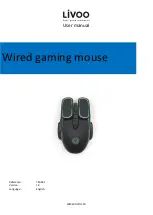
5
Figure 5. Distance from lens reference plane to surface
While reassembling the
components, please make sure
that the Z height (Distance
from lens reference plane to
surface) is valid. Refer to
Figure 5.
Sensor
Sensor PCB
Lens
Surface
VCSEL PCB
VCSEL
VCSEL Clip
2.40
0.094
Eye Safety
The ADNS-6000 and the
associated components in the
schematic of Figure A1 are
intended to comply with Class
1 Eye Safety Requirements of
IEC 60825-1. Agilent
Technologies suggests that
manufacturers perform testing
to verify eye safety on each
mouse. It is also recommended
to review possible single fault
mechanisms beyond those
described below in the section
“Single Fault Detection”.
Under normal conditions, the
ADNS-6000 generates the drive
current for the laser diode
(ADNV-6330). In order to stay
below the Class 1 power
requirements, resistor Rbin
must be set at least as high as
the value in the bin table,
based on the bin number of
the laser diode and LP_CFG0
and LP_CFG1 must be
programmed to appropriate
values. Agilent recommends
using the exact Rbin value
specified in the bin table to
ensure sufficient laser power
for navigation. The system
comprised of the ADNS-6000
and ADNV-6330 is designed to
maintain the output beam
power within Class 1
requirements over component
manufacturing tolerances and
the recommended temperature
range when adjusted per the
procedure below and when
implemented as shown in the
recommended application
circuit of Figure A1. For more
information, please refer to
Eye Safety Application Note
5088.
Enabling the SROM
The ADNS-6000 must operate
from the externally loaded
programming. This
architecture enables immediate
adoption of new features and
improved performance
algorithms. The external
program is supplied by Agilent
as a file which may be burned
into a programmable device.
A microcontroller with
sufficient memory may be
used. On power-up and reset,
the ADNS-6000 program is
downloaded into volatile
memory using the
burst-mode
procedure described in the
Synchronous Serial Port
section. The program size is
1986 x 8 bits.
For more information, please
refer to the ADNS-6000
datasheet.
Regulatory Requirements
Passes FCC B and
worldwide analogous
emission limits when
assembled into a mouse
with shielded cable and
following Agilent
recommendations.
Passes IEC-1000-4-3
radiated susceptibility level
when assembled into a
mouse with shielded cable
and following Agilent
recommendations.
Passes EN61000-4-4/IEC801-
4 EFT tests when assembled
into a mouse with shielded
cable and following
Agilent recommendations.
UL flammability level UL94
V-0.
Provides sufficient ESD
creepage/clearance distance
to avoid discharge up to
15kV when assembled into
a mouse according to usage
instructions above.
Содержание ADNK-6003
Страница 17: ...17 Figure C2 PCB Schematic Top Layer Figure C1 PCB Schematic Bottom Layer Appendix C PCB Layout...
Страница 18: ...18 Figure C4 PCB Schematic Bottom Overlay Figure C3 PCB Schematic Top Overlay...
Страница 19: ...19 Appendix D Base Plate Feature Figure D1 Overall view of base plate...






































